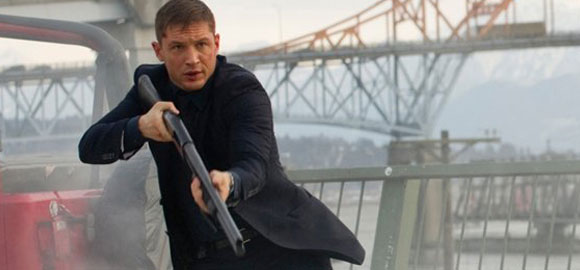Movie Review: This Means War
Mention director McG on an online forum or in the comments of a movie site and vitriol, often vicious, sometimes melodramatic and occasionally spot-on, will surely follow.
With the possible exception of Brett Ratner, McG (Terminator: Salvation, Charlie’s Angels: Full Throttle, Charlie’s Angels) receives opprobrium in almost complete disproportion to an admittedly mediocre career as a mainstream Hollywood director. McG’s latest effort, This Means War, a high-concept romantic action comedy co-written by Simon Kinberg (Mr. and Mrs. Smith, X-Men: The Last Stand) and Timothy Dowling (Just Go With It, Role Models), will do little, if anything to dispel or diminish online (or offline) criticism. It’s every bit as pedestrian, sometimes even sub-pedestrian, as his McG’s previous, underwhelming efforts.
This Means War centers on FDR (as in Franklin Delano Roosevelt) Foster (Chris Pine) and Tuck (Tom Hardy), best friends and two of the CIA’s best field agents (or so we’re expected to assume). Nothing comes between the swaggering, womanizing FDR and Tuck, a once-married, once-divorced, and father of one. They have each other’s backs as evidenced in the opening set piece where, contrary to the orders of their boss, Collins (Angela Bassett, perpetually under-used), they leave a trail of wanton destruction and bloodless corpses behind in their pursuit of This Means War nominal villain, Heinrich (Til Schweiger). Heinrich escapes, but his brother and partner-in-crime doesn’t, providing This Means War with the proverbial dangling thread. McG cuts sporadically to Heinrich as he attempts to find and eliminate FDR and Tuck, but it’s as perfunctory and uninspired as anyone would (and should) expect, reminders to less discerning moviegoers to expect a third- or final-act climax involving gun battles, car chases, and explosions.
Back in Los Angeles, Collins demotes FDR and Tuck to desk duty for their random acts of destruction and mayhem. FDR lives in a sleek, modern, spacious, well-furnished apartment equipped with a swimming pool for a ceiling that allows him to gaze upon the natural beauty of female swimmers. FDR’s bachelor pad would make Bond (any iteration) green with envy, not to mention inquisitive as to how exactly FDR can afford it all on a government salary (he can’t). Tuck (he’s unworthy of a last name), attempts to reconnect with his son and ex-wife, but fails. In response, FDR suggests it’s time Tuck wade back into the dating pool, which he does, posting his vitals to a generic online dating site.
Tuck’s (and later FDR’s) online match, Lauren Scott (Reese Witherspoon) works as a product researcher for Smart Consumer. For reasons that remain unexplained, Lauren unironically loves her position with the company. What she doesn’t love is the absence of a significant other in her romantic life. She moved to Los Angeles at the behest of a former lover. In an awkward, unfunny scene, Lauren runs into her ex-boyfriend and his new fiancée. Lauren turns into jelly, clumsily makes up a story about her new boyfriend, Ken (a surgeon, of course). FDR unconvincingly acquiesces in the subterfuge, thereby revealing his true, as yet unspoken, romantic longing for Lauren.
That’s not enough, however, to convince Lauren to try something, anything to restart her love life. It’s up to Trish (Chelsea Handler), Lauren’s obligatory, semi-unhappily married best friend, woefully misguided advisor, and vicarious thrill-seeker, to step in and “help.” Trish puts up Lauren’s vitals on an online dating site. Through happenstance and contrivance, the latter involving a video store, Lauren ends up dating Tuck and FDR simultaneously. Initially Tuck and FDR agree to a set of ground rules, a gentlemen’s agreement, but that quickly goes by the wayside when their competitive instincts take over, leading to questionable decision-making, up to and including invading Lauren’s privacy online and off. Neither seems fazed by the increasingly desperate, disquieting actions they take to one-up each other and exclusively gain Lauren’s romantic affections.
If there’s anything that almost (operative word being “almost”) makes This Means War, it can be found Hardy and Pine’s onscreen chemistry. As best-friends-turned-romantic-rivals, they make a credible duo. Unfortunately, the same can’t be said for Hardy and Pine’s chemistry with Witherspoon. That’s less Witherspoon’s fault than the muddled, middling script’s or McG’s turgid direction. Forcing Witherspoon to spend one-third of her time onscreen exchanging dialogue with late-night host-turned-non-actress Chelsea Handler doesn’t help either. Handler delivers her dialogue with the same bored, annoyed inflections she uses on her late-night talk show and her (hopefully) soon-to-be-canceled sit-com.
Showtimes and Tickets





